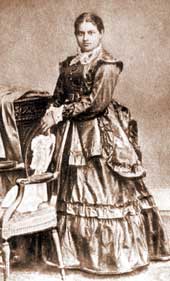
Born into the aristocratic Dutt family in Calcutta, Torulata Dutta was the youngest of three siblings. Toru’s father Govin Chunder Dutt was a noted linguist and a poet, and her cousins and uncles were also accomplished in the literary field. “the Dutt Family Album”, published by Govin in 1870 in London, bears evidence of the family’s literacy prowess.
The family converted to Christianity shortly after Toru’s birth and moved to Europe three years later, when Toru’s brother died. Govin made sure both his daughters were well-educated. They studied at a school in Nice, France, spent time in Paris and Boulogne, Italy, and then moved to England in 1870. Here, they studied music and history.
The girls began to translate French poems into English from an early age and created a companionship through writing. The family moved back to Calcutta in 1873 due to the girls’ poor health. Here, the girls began to write more, finding ways to cope with the stifling atmosphere in Calcutta. Unfortunately, their partnership came to an end in 1874, when Toru’s sister Aru died at the age of 23.
Toru spent the next three years writing a lot of poetry and prose for “The Bengal Magazine” and “The Calcutta Review”. In 1877, at the age of 21, Toru died due to tuberculosis.
Toru’s only work to be published during her lifetime was “A Sheaf Gleaned in French Fields”, a collection of English translations of French poetry. Toru left her first novel “Bianca” unfinished.
Excerpt
Toru was often called the Keats of Indo-English literature for the quality of her writing and meteoric rise to fame.
Sonnet
A sea of foliage girds our garden round,
But not a sea of dull unvaried green,
Sharp contrasts of all colors here are seen;
The light-green graceful tamarinds abound
Amid the mango clumps of green profound,
And palms arise, like pillars gray, between;
And o’er the quiet pools the seemuls lean,
Red – red, and startling like a trumpet’s sound.
But nothing can be lovelier than the ranges
Of bamboos to the eastward, when the moon
Looks through their gaps, and the white lotus changes
Into a cup of silver. One night swoon
Drunken with beauty then, or gaze and gaze
On a primeval Eden, in amaze.
Did you know?
Toru loved the Indian epics “The Ramayana” and “The Mahabharatha”, and often read old Sanskrit classics to gain first-hand knowledge of those stories.
Picture Credit : Google

